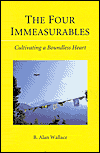
Spiritual practice, which is intended to remove suffering and to lead us to experience the glorious potential of the human spirit, is like the sprout of a little tree. When it's still very small, even a baby rabbit could come along and decapitate it. End of story. One future tree just bit the dust. You build a fence around it so the rabbits can't get to it. Later you may have to put up larger fences for the deer or the elephants.
You build whatever fences you need to protect something that is terribly vulnerable and extraordinarily precious — your happiness. Ethical discipline is really a way of protecting yourself so that your efforts in spiritual practice can flourish without getting stomped to smithereens every other day, or every other year.
Ten Guidelines to Protect Your Happiness & Well-Being
 The guidelines are fairly simple. If you only want one, instead of the 253 precepts that a monk takes on, avoid inflicting injury on yourself or others. We could stop right there. If you are imaginative, you can extrapolate all 253 from that one. There are ten, however, that are enormously helpful in a general way.
The guidelines are fairly simple. If you only want one, instead of the 253 precepts that a monk takes on, avoid inflicting injury on yourself or others. We could stop right there. If you are imaginative, you can extrapolate all 253 from that one. There are ten, however, that are enormously helpful in a general way.
The first three pertain to the physical body. Then there are four for speech, because we use speech an awful lot. And finally, three relate to the mind. Bear in mind that they are all a protection for your own well-being, in solitude or in community.
1. Avoiding killing, as far as possible. It's true that if we breathe or eat, we kill. At the very least, bacteria are getting knocked off. Being absolutely pure is an impossible notion, but we can be more pure than impure. We can inflict less killing rather than more.
2. Avoid sexual misconduct. This applies especially to adultery, but more generally to using the sexual domain as an area for inflicting injury.
3. Avoid taking what is not given.
4. Avoid lying. This is an obvious one: avoid consciously, intentionally deceiving others, leading them away from truth.
5. Avoid slander. Slander has nothing to do with whether the words are true or false. But if the motivation is to create divisions between people or provoke enmity, that's slander. If it's false, it's a lie too.
6. Avoid abuse. This has nothing to do with whether you are telling the truth or a falsehood. Speech can be completely true with no exaggeration at all, and still be entirely abuse. It has to do with motivation. Are we using our words as weapons to wound someone? If the motivation behind the words is to inflict injury, it is abuse.
7. Avoid idle gossip. This refers not to casual talk — as if we were only supposed to speak about "Meaningful Things" — but to speech that is motivated by craving, hostility, or other mental distortions. Idle gossip is pointless, but in a muted, gradual way it's also damaging. Tibetan teachers say that it's the least harmful of the ten nonvirtues, and the easiest way to waste a whole life.
8. Avoid malice, or ill will. This state of mind is so painful to experience, it's amazing that people ever indulge in it at all. It's like having a snake in your lap, or eating excrement. Why would we ever want to give it two seconds if we had noticed it in the first? It's terrible to wish another sentient being harm. Wishing them to suffer hurts us.
9. Avoid avarice. This is not just desire; if I'm thirsty I desire water, and that's fine. Avarice is craving for something that belongs to somebody else, not wanting them to have it because I want it.
10. Avoid what are called false views. This refers not to doctrine, whether Buddhist, or Christian, or Hindu, or atheist, but to a mindset that denies fundamental truths. For example, a false view is the belief that our actions are inconsequential — that it doesn't really matter how we behave because things are controlled by chance or by fate, so we may as well just get by and have a good time. That is totally false, but people believe it, to varying extents. They think we can act or speak in certain ways with no repercussions. To shift to Buddhist terminology, it would be a denial of the truth of karma. Karma means action, and the law of karma is that actions have results. To deny this is just a view, but a view that can modify an entire life.
These ten precepts are simple, but they can be followed, and they set up a foundation in which the rest of these sometimes exalted practices and transformations of experience can take place. Without these simple things, we are probably just building sandcastles.
Protecting Your Buddha-Nature with Ethical Discipline
It's interesting to note that they are all negative restraints: "Avoid this." It doesn't say be good, or tell the truth. The negative approach indicates the quality of protection. We have something very precious — our life, our mind, our buddha-nature, our goals and aspirations — and we want to protect these. By simply avoiding the ten nonvirtuous actions, you create a space for this little plant to grow. With this kind of protection, a little practice, a little concern, it grows into a redwood tree which after a while doesn't need any protection at all. It provides protection to other creatures.
In this way, ethical discipline is temporary insofar as it requires effort. As our own potential becomes manifest, as the wholesome qualities become stronger, then discipline falls away, because the virtue of our own mind is then protecting itself. An enlightened being can be utterly spontaneous at all times, without any restraint at all.
Reprinted with permission of the publisher, Snow Lion Publications.
©1999. www.snowlionpub.com
Article Source
The Four Immeasurables: Cultivating a Boundless Heart
by B. Alan Wallace.
 This book is a rich suite of practices that open the heart, counter the distortions in our relationships to ourselves, and deepen our relationships to others. Alan Wallace presents a unique interweaving of teachings on the Four Immeasurables (the cultivation of loving-kindness, compassion, equanimity, and empathetic joy) with instruction on quiescence or shamatha meditation practices to empower the mind and render it "fit for service." The book includes both guided meditations and lively discussions on the implications of these teachings for our own lives.
This book is a rich suite of practices that open the heart, counter the distortions in our relationships to ourselves, and deepen our relationships to others. Alan Wallace presents a unique interweaving of teachings on the Four Immeasurables (the cultivation of loving-kindness, compassion, equanimity, and empathetic joy) with instruction on quiescence or shamatha meditation practices to empower the mind and render it "fit for service." The book includes both guided meditations and lively discussions on the implications of these teachings for our own lives.
Info/Order this book
About the Author
 B. Alan Wallace, Ph.D., is a lecturer and one of the most prolific writers and translators of Tibetan Buddhism in the West. Dr. Wallace, a scholar and practitioner of Buddhism since 1970, has taught Buddhist theory and meditation throughout Europe and America since 1976. Having devoted fourteen years to training as a Tibetan Buddhist monk, ordained by H. H. the Dalai Lama, he went on to earn an undergraduate degree in physics and the philosophy of science at Amherst College and a doctorate in religious studies at Stanford. He is the author of numerous books including A Guide to the Bodhisattva Way of Life, Buddhism with an Attitude, The Four Immeasurables, Choosing Reality, Consciousness at the Crossroads. and Buddhism and Science.
B. Alan Wallace, Ph.D., is a lecturer and one of the most prolific writers and translators of Tibetan Buddhism in the West. Dr. Wallace, a scholar and practitioner of Buddhism since 1970, has taught Buddhist theory and meditation throughout Europe and America since 1976. Having devoted fourteen years to training as a Tibetan Buddhist monk, ordained by H. H. the Dalai Lama, he went on to earn an undergraduate degree in physics and the philosophy of science at Amherst College and a doctorate in religious studies at Stanford. He is the author of numerous books including A Guide to the Bodhisattva Way of Life, Buddhism with an Attitude, The Four Immeasurables, Choosing Reality, Consciousness at the Crossroads. and Buddhism and Science.
Books by this Author:
at InnerSelf Market and Amazon



























